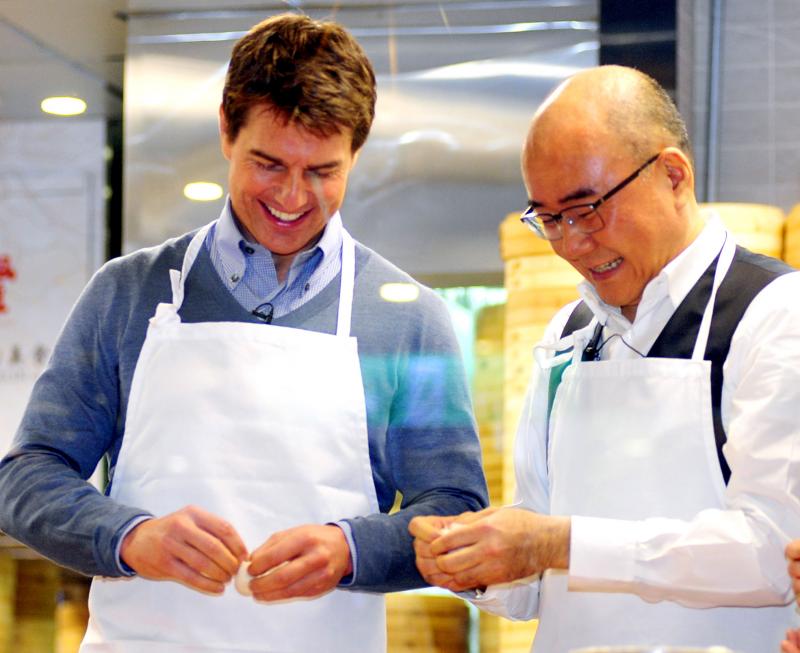Hit by the COVID-19 pandemic, Taiwan-based restaurant chain Din Tai Fung announced on Instagram that it would close its first US outlet in Arcadia, California after service on June 11 following two decades of operation. The iconic chain is best known for its “xiaolongbao” (steamed soup dumplings), and was named one of the world’s top 10 gourmet restaurants by The New York Times in 1993.
“We first opened this location over 20 years ago to introduce Taiwanese cuisine, culture and our signature xiaolongbao to our guests here in the US,” the post wrote. “This year marks the 20th anniversary of this location, making the decision all the more heartbreaking,” it also noted, adding that the restaurant chain plans to open an outlet in Las Vegas.
Din Tai Fung opened its first store on Taipei’s Xinyi Road in 1958, and it has since expanded to 11 countries with about 150 stores worldwide. In February, it also opened its largest flagship store in Taiwan across from the original store.

Photo: Pan Shao-tang, Liberty Times 照片︰自由時報記者潘少棠
(Eddy Chang, Taipei Times)
受到武漢肺炎(新冠病毒,COVID-19)爆發衝擊,台灣連鎖餐廳鼎泰豐在IG宣布,在美國的第一家分店——加州的阿凱迪亞分店——於六月十一日營業結束後歇業,該分店已營業二十年。極具代表性的鼎泰豐以小籠包而聞名,於一九九三年,被《紐約時報》評選為世界十大美食餐廳。
貼文說︰「我們最初二十年前在此處開店,向美國顧客介紹台灣美食、文化及招牌小籠包。」還提到:「今年正好是該分店的二十週年,也使得這個決定更加令人心碎。」並透露計劃在賭城拉斯維加斯開新店。
鼎泰豐於一九五八年,在台北市的信義路開設了第一家餐廳,目前已擴展至全球十一個國家、約一百五十幾家分店。稍早在二月時,更在創始店對面新開了全台灣最大的旗艦店。
(台北時報張聖恩)

Have you ever wondered why “Manila envelopes” carry that name? The answer lies in a plant native to the Philippines. Though a fruit-producing plant, abaca is most valued for its leaf stalks, which are __1__ to extract fibers known as “Manila hemp.” These fibers are known for their strength and resistance to saltwater. Because of its __2__ in sea environments, Manila hemp has long been used to make Manila rope, a staple in the sailing and maritime industries for centuries. It withstands harsh ocean conditions without its flexibility being __3__. Manila rope doesn’t break down easily when exposed to

A: In addition to boyband Energy’s concerts, Taiwan’s first major male dance revue has attracted attention. B: Several South Korean male dance revues and Australia’s Thunder from Down Under often tour Taiwan. Now Taiwan’s first all-male revue has finally appeared. A: According to the Liberty Times, Muscle High: A Male Dance Revue from Taiwan, featuring 13 hunks, opened last month and will run until Sept. 14. B: The rise of “hunk fever” in recent years has even caused a trend of working out in Asia. A: Let’s go to the Taipei Music Center’s Sub Livehouse for the show. A:

A: Any fun events happening this weekend? B: Boyband Energy’s concerts and Taiwan’s first major male dance revue have both sparked anticipation recently. A: Energy staged a comeback last year — 15 years after they disbanded — and they’re now more popular than ever. B: Their megahit “Friday Night” even won Song of the Year at the Golden Melody Awards. A: To pay tribute to the Queen of Pop Madonna, they added her choreography of 16 continuous jump squats to their music video, prompting a “16-squat challenge” that went viral across Taiwan. Do you wanna try it out? A:

In a major step to combat carbon emissions, Norway’s pioneering “Northern Lights project” is set to expand its carbon capture and storage (CCS) capabilities. Backed by energy giants and the Norwegian government, this collaborative project is working to increase its annual carbon storage capacity from 1.5 million to over five million tons. Northern Lights focuses on capturing CO2 emissions from industrial sources across Europe and securely storing them underground. Captured CO2 will be liquefied and transported by ship to the storage facility located off the coast of Norway. It will be injected through pipes into geological formations about 2,600m below the